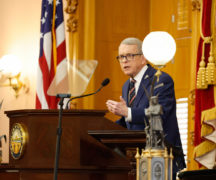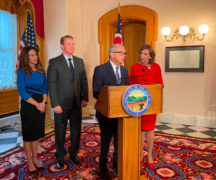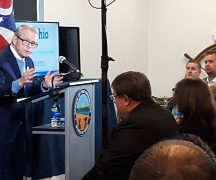BY NICK EVANS
In the Ohio Statehouse rotunda Monday, Gov. Mike DeWine struck an optimistic tone to begin his second term as governor. The 76-year-old has spent more than half his life in public office, and the next four years may well be his last in an elected post.
He begins the term after securing big corporate investments and major infrastructure projects. The state has weathered a global pandemic and come out more or less intact.
Still, there are plenty of challenges rushing up to greet the governor. The House GOP caucus remains bitterly divided after a “coup” in the race for speaker. That infighting could make even the simplest legislative action grind to a halt as lawmakers look to settle scores. This year they have to craft a budget — a tense, demanding task even at the best of times.
Victory laps
DeWine began his speech looking backward and taking credit for the accomplishments of his first term.
“Not long into my first term we found ourselves facing an invisible enemy that threatened our health and our lives,” DeWine said. “Yet Ohioans rallied as you always do and showed the world your true resilience and toughness.”
DeWine’s handling of the crisis angered people at different ends of the political spectrum at different times. The COVID-19 pandemic also isn’t exactly over. But DeWine’s steady hand on the tiller helped earn Democratic votes that likely wouldn’t have been there otherwise.
DeWine boasted about Intel, “the highest tech manufacturing known to man.” He bragged about “first class” infrastructure, “including a brand new bridgethat we’re soon going to start building across the Ohio River at Cincinnati.” Both have the potential to redefine their region for a generation. They’re also both products of significant cooperation with a presidential administration DeWine was happy to criticize on the campaign trail.
Promises, promises
Looking ahead, DeWine sought to turn the state’s challenges into an opportunity. Zeroing in on addiction, DeWine promised to go after “the drug dealers who are peddling poison to our citizens.”
“We will transform Ohio into the best state of the nation for mental health treatment,” DeWine said. “And we will transform Ohio into the best state of the nation for mental health research, and the best state in the nation for mental health prevention.”
DeWine also made an explicit pitch to recent immigrants.
“If you are a legal immigrant who has recently come to this country, looking to build a better life for your family, to earn a living, to create a home, and to contribute to your community. I invite you to come to Ohio because you will be welcomed here.”
Despite DeWine’s emphasis on legal arrivals, immigrant outreach hasn’t exactly been a centerpiece of the Republican platform. As an example, DeWine referenced Ukrainians who have sought sanctuary during the war.
“To all these new Ohioans, we say welcome home,” DeWine said.
Democrats’ response
Shortly after DeWine’s speech, Minority Leader Allison Russo spoke to reporters in a side room. She struck an optimistic tone for the coming term as well. After all, her caucus helped engineer that last minute coup in the speaker’s race and picked up important concessions along the way.
She praised DeWine’s emphasis on investing in people and opportunity.
“We are willing to work with the governor on those issues that we think create an Ohio that creates a good place for our people, our children,” Russo said. “We will work together with him on that and fight back on the things that we think don’t meet those goals.”
Looking ahead in the House term, she dismissed the ongoing fight within the Republican caucus as “a distraction.” She also expressed doubts the controversial measure to impose a supermajority on future constitutional amendments would make the May ballot. It would need to garner 3/5ths support in both chambers by Feb. 1, Russo explained.
“(There’s) lots of organizing that has to be done; we have committees that have to be established, etcetera,” she described. “So I don’t think that there is a rush to get that across the finish line by Feb. 1.”
There’s also another redistricting fight looming, but Russo is feeling sanguine about that, too.
“My hope is that there will be a bipartisan commitment to get to bipartisan compromise,” she explained. Pressed on whether she’d gotten concessions on that front during the speaker’s race, Russo said there’s “just an understanding of why it’s important to move forward and try to find a bipartisan compromise.”
“Members — all members — Republicans or Democrats, don’t want to keep doing this every couple of years,” she added.





